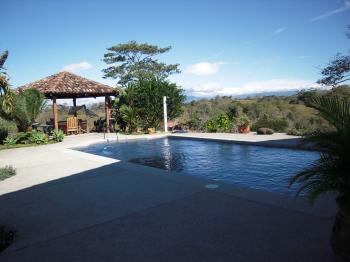The proceeds of a property closing in Costa Rica need to appear correctly in a deed. Why is that?
I had what looked like a simple closing and it almost turned into a nightmare. That happened because the rules are changing.
After closing, the seller deposited the proceeds of the sale in her local bank account (a cashier’s check). So after clearance, she could wire the money to her account in the US. Once the cashier’s check was deposited, the bank froze the funds due to bank compliance and proof of the origin of the funds.
The closing attorney, the seller, and the realtor all went through hell for two weeks but eventually got it all straightened out. Let me tell you what happened.
In most real estate transactions, it is customary for me and all my agents to write up a formal offer which the buyer’s real estate attorney can use to write up an option to purchase-sale agreement, in Spanish called a “Promesa Recíproca de Compra y Venta“, where the buyer promises to purchase the house or land at X amount in X amount of time and the seller agrees to this.
The option explains everything about the property and the details of the transaction and how funds will be disbursed. In this case, both the seller and the buyer were out of the country and to make them both go through a Costa Rican consulate to sign the option didn’t make any sense. Therefore, we went straight to closing without even writing up an option to the purchase-sale agreement.
Property Tax
Nobody likes to pay taxes, and buyers and sellers always try to pay as little closing cost as possible. Costa Rica properties have a value in the property register which is much lower than the actual value. In many cases, it was the original value of the lot before the house was built, many years ago. In other cases, it is a value that was used when the property was bought by the actual owner, 30 years ago, when the dollar exchange was ¢8,70. 
To save on closing costs for their clients, many real estate attorneys transfer the title at a value a little higher than the actual registered value. This value is usually much lower than the real sales price.
That is one of the main reasons for the potholes and the lack of infrastructure in this beautiful country. But that is a different story, which we’ll keep for another newsletter.
So when your closing attorney writes up the property deed, and he uses a sales price that does not match the cashier’s check, watch out! When you take the check to the bank, the paperwork does not match the check. The bank teller might not even accept your check.
Deposit the proceeds in your bank account
This is what happened in the case of my seller last week. The bank had a deed with a much lower amount than the amount stated on the check. Instead of rejecting the deposit, the bank accepted the deposit. They then froze the funds, alleging the proof of origin of the funds was incorrect. The money laundering laws oblige banks to check the source of the funds.
DO NOT ACCEPT ANY CASH.
First, find a good real estate agent
So what should you do about that? I’m not an attorney. When selling or buying a property, first find yourself a real estate agent who knows what he/she is doing. The agent will walk you through the whole process. But you also need a real estate agent who will be there when you hit on problems AFTER the transaction. You will find that most real estate agents will disappear on you as soon as they have received their commission check.
Option to purchase sale agreement
 I think that, in most cases, a photocopy of the option to purchase-sale agreement accompanying the deposit of the proceeds should be enough, if in the agreement you use the correct sales price. Do you really want to be totally sure this is done correctly? Then do it as it works in other countries. Oblige your attorney to register the real sales price in your transaction.
I think that, in most cases, a photocopy of the option to purchase-sale agreement accompanying the deposit of the proceeds should be enough, if in the agreement you use the correct sales price. Do you really want to be totally sure this is done correctly? Then do it as it works in other countries. Oblige your attorney to register the real sales price in your transaction.
In the case of a transfer of shares of the corporation, the copy of the option to purchase sale agreement should suffice. Because then there will be no deed. But note that the buyer’s attorney might not like the idea of transferring shares of an existing corporation. For the buyer, there is a risk of that corporation having hidden debts and obligations.
Negotiating a property
How does this all work in the negotiations of the purchase of the property? Almost customarily, when the buyer makes a low offer on the property, the seller will counter this offer but tell the buyer to pay the closing cost. Therefore, the buyer will look how to keep the closing cost as low as possible, which can only be done by either taking over the corporation (if the property is owned by a corporation) but then the buyer will have the risk of buying a corporation with problems, or by using a fake closing price. This, in turn, will not suit the seller as he might not have any access to the funds as they will be frozen by the bank.
In short, both the buyer as well as the seller should make very sure they use a reliable and experienced real estate agent. Preferably one who is an affiliate of the American European Real Estate Group.


















